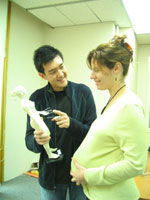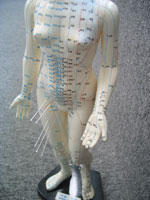TCM Understanding of Female Infertility
|
Infertility is a big concern nowadays. This is partly because more people have
delayed marriage and childbearing until certain educational or career goals are reached. Generally, infertility is defined as an inability to conceive after a year or more of regular sexual activity without using birth control. In females, primary infertility is when a woman has never been able to conceive and become pregnant; while secondary infertility is when there has been a previous pregnancy and a couple is unable to conceive after a year of unprotected and appropriately timed intercourse.
 |
| Primary infertility is when a woman has never been able to conceive and become pregnant. |
In reviewing TCM literature, the term "infertility" was seen as early as the 2nd century BC. Chapter 60 of the classic Suwen (The Book of Plain Questions) states: "If the Governor Vessel is damaged, the woman will be infertile." Thereafter, relevant knowledge was shaped and consolidated by accomplished medical practitioners of different medical approaches, and their findings were gathered and published in various medical works. Some notable theories for its causes are listed below:
- In the Western Jin Dynasty (265-316AD), the book Zhenjiu Jiayijing (Systemic Classic of Acupuncture and Moxibustion) stated that infertility was caused by blood stagnation, and, the problem should be treated with acupuncture and moxibustion.
- In the Sui Dynasty (581-618 AD), the book Zhubing Yuanhoulun (Treatise on Causes and Symptoms of Diseases) stated infertility could be caused by overstrain or invasion of the six evils damaging the uterus directly. This theory became an important principle in treating infertility later on.
- In the Tang Dynasty (618-907 AD), the book Qianjin Yaofang (Prescriptions Worth a Thousand Gold for Emergencies) named infertility as "quan wu zi"(complete sterility), "duan xu"(having no progeny) and "jue si"(without a descendant). It claimed that causes of infertility can be divided into two types, congenital physiological defects and acquired pathological changes.
- In the Song Dynasties (960-1279 AD), Chen Ziming claimed in his book Furen Daquan Liangfang (The Complete Book of Efficacious Prescriptions for Women) that female infertility is closely related to the Thoroughfare Vessel, Conception Vessel and kidney-qi.
- In the Jin-Yuan Period (1115-1368 AD), the famous physician Zhu Zhenheng (1281-1358) pointed out that the phlegm and the dampness evils are important factors for infertility. He used a therapeutic strategy of "drying dampness and expelling phlegm" to treat it.
- In the Ming Dynasty (1368 - 1644 AD), Jingyue Quanshu (The Complete Work of Zhang Jingyue) outlined the physiology and pathology of pregnancy in detail and stressed the importance of the vital gate for female reproduction. The book also innovated therapeutic strategies like "regulating the menstruation" and "enhancing and replenishing the vital gate" to promote conception, these strategies were often recommended by later physicians. Furthermore, Guangsi Jiyao (Major Rules to Prosperous Progeny) by Wan Quan described five congenital deformities in the female reproductive system that made women unable to become pregnant.
- In the Qing Dynasty (1644-1911 AD), Chen Xiuyuan wrote in his book Nuke Yaozhi (Essential on Obstetrics and Gynecology) that one major reason for female infertility was irregular menstruation, which is usually caused by damage from the seven emotions and the six evils or disharmonies in the yin yang, qi (vital energy) or blood.
As you can see, TCM recognized several major causes of infertility a long time ago. Through the centuries, TCM has formulated a wide variety of therapeutic treatments for these causes, and many of these remedies are still widely accepted in both Western and TCM medicinal traditions. Common treatments revolve around: |
In a woman: |
| 1. |
Regulating the menstrual cycle. |
 |
| TCM remedies are especially helpful for those who need to turn back the clock of time and rejuvenate their fertility. |
|
| 2. |
Relieving hormonal disturbances. |
| 3. |
Enhancing immune compatibilities between sexual partners. |
| 4. |
Amending tubal obstructions. |
| 5. |
Releasing stress-related dysfunction. |
| In the man: |
| 6. |
Increasing sperm count and motility. |
| 7. |
Improving ejaculatory and erectile conditions. |
| |
|
While Western medicine targets certain situations specifically, benefits of a TCM approach are in addressing all aspects of infertility causes and focusing on eliminating their ultimate pathological outcomes. TCM remedies have positive effects on general physical health and emotional well-being, which are especially helpful for those who need to turn back the clock of time and rejuvenate their fertility. |
|
|